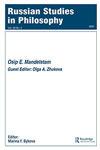文化与诗歌:奥斯普·曼德尔斯坦作品中的同步命令
IF 0.1
4区 哲学
Q4 Arts and Humanities
引用次数: 0
摘要
摘要本文试图不去理解奥西普的诗歌和文体特征。E.Mandelstam的诗学作为其作品的哲学-文化学方面,一直受到语文学家的极大兴趣,因此迄今为止得到了充分的研究。为了填补这一空白,我们必须将曼德尔斯坦的诗歌作品与他的散文、理论、批评和论战进行比较。诗人在这些文体中的表述在很大程度上阐明了他对文化的态度。特别是,本文考察了诗人对哲学和自然科学的兴趣问题,这一问题既表现在他的诗歌中,也表现在他对文化的态度中。他的理论出版物也揭示了他在诗歌方面的实验。曼德尔斯坦将他的当代文化与历史上存在或曾经存在的其他文化进行了比较,他异想天开的文化学联想避免了任何详细的叙事发展,只突出了个人特征,并产生了一些明显必要的细节。这恰恰证明了曼德尔斯坦诗歌的特殊性。这样的技巧需要读者的某种合作和共同创造,这正是当代后现代主义美学所要求的。本文还强调了从理论和哲学角度理解诗人作为一个独立的诗歌体系的阿克迈斯主义与20世纪前几十年存在的其他艺术潮流的关系,尤其是与影响曼德尔斯坦自己作品的象征主义和未来主义的关系。本文章由计算机程序翻译,如有差异,请以英文原文为准。
Culture and Poetry: The Synchronic Imperative in Osip Mandelstam’s Work
ABSTRACT This article attempts to understand not so much the poetic and stylistic features of Osip. E. Mandelstam’s poetics, which has been of great interest to philologists and thus sufficiently studied to date, as the philosophical–culturological aspects of his work. To fill this lacuna, it is vital that we compare Mandelstam’s poetic works with his prose, theory, criticism, and polemics. The poet’s statements in these genres largely clarify his attitude toward culture. In particular, this article examines the question of the poet’s interest in philosophy and the natural sciences, which is expressed both in his poems and in his attitude to culture. His publications on theory also shed light on his experiments in poetry. Drawing parallels between his contemporary culture and other cultures that exist or had existed in history, Mandelstam’s whimsical culturological associations avoid any detailed narrative development, highlighting only individual features and producing a number of apparently necessary details. This is precisely what testifies to the specific features of Mandelstam’s own poetry. Such a technique requires a sort of co-authorship and cocreation on the reader’s part, the very kind that a contemporary postmodernist aesthetic calls for. The present article also highlights the issue of theoretical and philosophical understanding of the poet’s Acmeism as an independent poetic system in relation to other artistic trends that existed in the first decades of the twentieth century, above all in relation to Symbolism and Futurism, which influenced Mandelstam’s own work.
求助全文
通过发布文献求助,成功后即可免费获取论文全文。
去求助
来源期刊

RUSSIAN STUDIES IN PHILOSOPHY
PHILOSOPHY-
CiteScore
0.10
自引率
0.00%
发文量
14
期刊介绍:
Russian Studies in Philosophy publishes thematic issues featuring selected scholarly papers from conferences and joint research projects as well as from the leading Russian-language journals in philosophy. Thematic coverage ranges over significant theoretical topics as well as topics in the history of philosophy, both European and Russian, including issues focused on institutions, schools, and figures such as Bakhtin, Fedorov, Leontev, Losev, Rozanov, Solovev, and Zinovev.
 求助内容:
求助内容: 应助结果提醒方式:
应助结果提醒方式:


